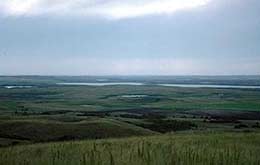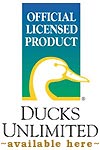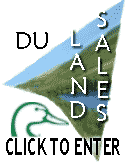
 |
|
|||||||||
 |
| |||||||||
|
To log
into Members Only: Need Help? | |||||||||
| U.S. Farm Bill Will Establish New Wildlife Program
Scientific Studies Indicate The Program Is Overdue MEMPHIS, TN, May 2002----Months, if not years, of hard work and lengthy debate have finally produced an omnibus Farm Bill, weighing in at 13.5 pounds. The President signed the bill into law on May 13. One of the outcomes of this landmark legislation will be the establishment of a new program known simply as the GRP. The GRP---Grasslands Reserve Program---will do wonders for grassland nesting birds, which are currently experiencing the steepest decline of all birds in the U.S. The GRP, like its sister programs, the Conservation Reserve Program and the Wetlands Reserve Program, is a voluntary, incentive based program that helps farmers implement wildlife friendly practices on their land.  Enrollment in the grasslands program
will take place across the country but will have a significant
impact on the Prairie Pothole Region, which includes North and South
Dakota, and parts of Montana, Iowa and Minnesota. "DU has assigned
our highest level priority to the pothole region because it
represents the most significant breeding waterfowl habitat in the
world," said Dr. Alan Wentz, Group Manager of Conservation Programs
at DU. "The region has lost much of its native grasslands and upland
cover with resulting damage to nesting ducks, but those grasslands
that remain and are eligible for GRP are absolutely critical to the
future of waterfowl populations on this continent," continued Dr.
Wentz. Enrollment in the grasslands program
will take place across the country but will have a significant
impact on the Prairie Pothole Region, which includes North and South
Dakota, and parts of Montana, Iowa and Minnesota. "DU has assigned
our highest level priority to the pothole region because it
represents the most significant breeding waterfowl habitat in the
world," said Dr. Alan Wentz, Group Manager of Conservation Programs
at DU. "The region has lost much of its native grasslands and upland
cover with resulting damage to nesting ducks, but those grasslands
that remain and are eligible for GRP are absolutely critical to the
future of waterfowl populations on this continent," continued Dr.
Wentz. According to Jeff Nelson, who directs Ducks Unlimited's Great Plains Regional Office in Bismarck, North Dakota, the prairies once formed one of the largest grassland tracts in the world. "What once stretched endlessly across the Great Plains in a sea of grass is now one of the most vulnerable ecosystems in the world," said Nelson. In testimony representing more than 40 environment and wildlife groups before a U.S. House subcommittee, Nelson recently called attention to severe grassland losses. "Although most of these lands are marginal in value for agricultural production, they are in most cases highly valuable and necessary habitat for a large variety of wildlife, as well as the ranching industry," said Nelson. The GRP is based on a very successful and rapidly growing conservation tool---voluntary conservation agreements, which are binding contracts in which a landowner agrees to conserve marginal cropland for various periods of time in exchange for a government payment. Voluntary conservation agreements form the basis for GRP's successful forerunners, the CRP and WRP. Great strides can be made to restore and protect grasslands, at least in the short-term, if history is an accurate guide; under the Conservation Reserve Program alone, more than 33 million acres of U.S. farmland have been enrolled in ten to fifteen year conservation agreements. Scott Stephens, a Ducks Unlimited research biologist with DU's Great Plains Regional Office in Bismarck, has been studying the connection between grasslands and reproductive success of ducks and other grassland nesting birds for the past two years. "With information on over 4,000 duck nests after the first two years of research, there is strong evidence that nesting success is substantially higher in areas where over 70% of the four square mile site is comprised of grassland," said Stephens. "Although breeding ducks will take advantage of other grassland cover types such as CRP, several species of shorebirds only nest in the native pastures," added Stephens, noting that further pasture losses will compound the decline of shorebird populations. Darin Blunck, a Database Manager at Ducks Unlimited's Bismarck office, is drawing similar conclusions from a completely different point of view----the stars. Blunck is using highly detailed maps that provide a wealth of information gleaned from satellites in the sky. The satellites' remote sensors detect solar energy reflected off the earth's surface. The maps provide layers of information about ground cover, vegetation, water availability, pollution impacts, and much more. By analyzing the maps, scientists can gauge grassland loss on a landscape level. The need for a grassland conservation program is "a no-brainer," says Blunck. He explains: "The remaining prairie grasslands are generally located in rocky, hilly areas that are highly erodible and of marginal quality for row crops. Agricultural production on these lands is not terribly efficient." Scientific evidence underscoring the need for grassland conservation can also be found in a study funded by Ducks Unlimited, the Nature Conservancy and the National Cattlemen's Beef Association. The study, "United States Grasslands and Related Resources: An Economic and Biological Trends Assessment," describes the impact of lost grasslands on wildlife. "Birds that require native grasslands for breeding habitat are the most declining group of birds in North America," says the report. The report also points out that since the 1700s, the U.S. has lost a larger portion of grassland than the former Soviet Republics, China and South America. "The science is clearly stacked in favor of this new program. But the non-scientific evidence is also compelling," said Scott Sutherland, who directs Ducks Unlimited's Governmental Affairs office. Last summer, Sutherland arranged meetings between landowners and members of Congress to put a human face on the pressing need for agricultural conservation programs. "Loss of grasslands is a concern that runs deep, particularly for families with a long ranching tradition. It's a way of life that is slipping away. But undoubtedly we all share the environmental consequences when the native landscape is altered beyond recognition," said Sutherland. The new Grasslands Reserve Program will enroll up to two million acres of grassland in 10, 15, 20, and 30-year contracts, as well as perpetual easements, at a cost of approximately $254 million. $1.517 billion has been allotted to the Conservation Reserve Program, which will increase its total acreage enrollment from 36.4 million to 39.2 million. The Wetlands Reserve Program will get $1.5 billion to raise the program's total acreage cap to 2.275 million acres. To learn more about the conservation title - click here of the U.S. Farm Bill. |

|
Copyright 2002 Ducks Unlimited, Inc. All rights reserved. Please read our Call To Action, Legal Notice, and Privacy Policy.
Comments? Questions? Contact Ducks Unlimited.
Site is best viewed in Internet Explorer 6.0.




